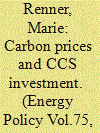| Srl | Item |
| 1 |
ID:
136242


|
|
|
|
|
| Summary/Abstract |
Carbon Capture and Storage is considered as a key option for climate change mitigation; policy makers and investors need to know when CCS becomes economically attractive. Integrating CCS in a power plant adds significant costs which can be offset by a sufficient CO2 price. However, most markets have failed: currently, the weak carbon price threatens CCS deployment in the European Union (EU). In China, a carbon regulation is appearing and CCS encounters a rising interest. This study investigates two questions: how much is the extra-cost of a CCS plant in the EU in comparison with China? Second, what is the CO2 price beyond which CCS plants become more profitable than reference plants in the EU and in China? To address these issues, I conducted a literature review on public studies about CCS costs. To objectively assess the profitability of CCS plants, I constructed a net present value model to calculate the Levelised Cost of Electricity and the breakeven CO2 price. CCS plants become the most profitable plant type beyond 115 €/tCO2 in the EU vs. 45 €/tCO2 in China (offshore transport and storage costs). I advise on the optimal plant type choice depending on the CO2 price in both countries.
|
|
|
|
|
|
|
|
|
|
|
|
|
|
|
|
| 2 |
ID:
177106


|
|
|
|
|
| Summary/Abstract |
The German federal government has set a target for German industry to reduce its GHG emissions by 49%–51% by 2030 compared to 1990. Fuel switching to electricity and biomass is a potential measure to meet this target. In this article, we simulate the contribution of fuel switching by applying economic incentives and regulatory measures. The policy instruments of a CO2 price and technology-specific subsidies are applied with varying intensity. In addition, we simulate accelerated stock replacement and a ban on new fossil-based steam generation systems. Results show that combining fuel switching and energy efficiency could achieve emission reductions of 50% by 2030 compared to 1990 only combined with considerable economic pressure (up to 300 €/tCO2) and financial support for electricity-based process heating.
|
|
|
|
|
|
|
|
|
|
|
|
|
|
|
|
| 3 |
ID:
177425


|
|
|
|
|
| Summary/Abstract |
Carbon emissions from the industrial sector represents nearly 21% of global carbon emissions. The chemical manufacturing industries are a major part of the industrial sector, which tends to be less included in battle against climate change. This paper analyses the impact of natural gas prices on carbon abetment costs while analysing IRR and payback period for different CO2 prices, using the linear optimisation model MESSAGE. We show that carbon capture and solar technology may provide the technology mix for deep carbon reduction targets by 2030. In addition, the volatility in natural gas prices was found to create an increase in the abatement costs by $20/Ton as the gas prices increase by $0.10/MMBTU. Furthermore, we find that the minimum carbon price needed is $27/Ton to make investments viable though at a long payback period, 9.5 years. Results show practical scenarios complemented with policy recommendation for energy transition in the chemical industry to achieve climate targets by 2030. This suggests that current commercial prices of carbon ($29/Ton in Europe) may be sufficient to pay off the costs required for carbon capture.
|
|
|
|
|
|
|
|
|
|
|
|
|
|
|
|